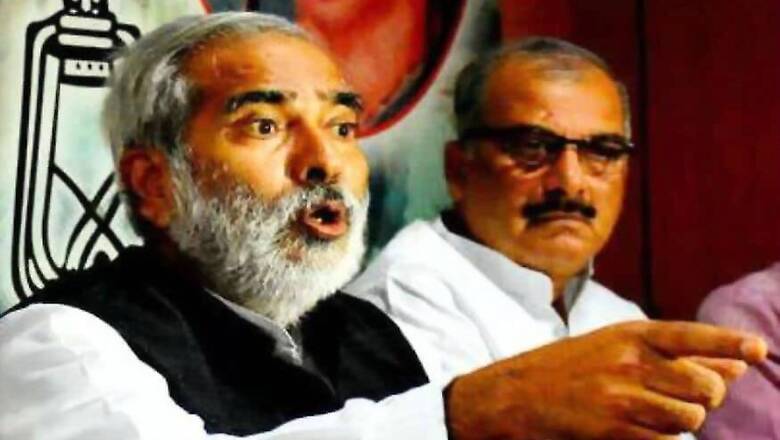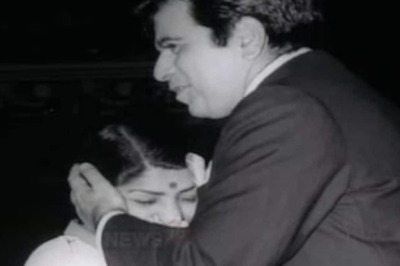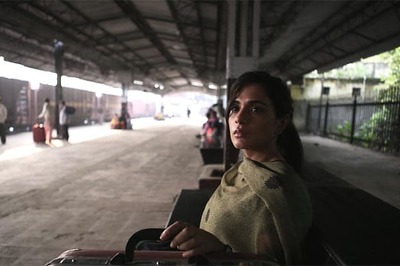
views
As member of Parliament, Raghuvansh Prasad Singh stayed right opposite BJP national headquarters in Delhi’s Ashoka Road. That was before 2009, when the BJP was in opposition and had not shifted to the swanky multi-storied building on Deen Dayal Upadhyay Marg.
Raghuvansh babu was a minister in Manmohan Singh government. The Rural Development Minister that is. A minister who would not mind walking to his chamber in Krishi Bhawan after an early morning meal (he generally had only one through the day), and stay put through the day, meeting bureaucrats, journalists and political workers till late in the evening.
He spoke chaste Hindi while making a point and retorting to objections and opinions articulated in Oxbridge English during cabinet meetings.
Raghuvansh Prasad Singh was the Jitendra Kumar of the Manmohan Singh government. His vintage rustic performance lent a aura and appeal to Rural Development ministry.
He was the minister who piloted the Mahatma Gandhi National Employment Guarantee Scheme. The biggest rural poverty alleviation programme in the world which has withstood the test of time. Fifteen years after it was drafted and implemented, and trashed many times over in and outside Parliament, all governments — both state and Centre — in the last 15 years have relied upon this one scheme to lift the rural economy out of distress, be it drought or global pandemic.
A Rajput by caste, Raghuvansh Prasad Singh’s nomination in the Union cabinet by Lalu Yadav in 2004 after UPAs shock victory was a well thought out move. RJD chief had stitched a perfect caste combination of OBC-Muslims-Dalits and topped it up with a splash of upper caste votes to pulverise NDA at the hustings. Upper caste leaders like Raghuvansh Prasad (Rajput) and Akhilesh Singh (Bhumihar) not only won their seats but were made ministers to send a strong message to BJP’s core constituency.
So, while Lalu got the plum Railway Ministry in UPA-I, he did see merit in nominating others from upper caste to key ministries.
But just ahead of the 2009 Lok Sabha polls, Lalu and Ram Vilas Paswan made a fatal mistake by unilaterally declaring candidates for seats in Bihar, leaving Congress in a lurch. The division of votes helped NDA win big in Bihar, but Congress gained in other states to increase its tally and return to power.
Raghuvansh Babu was one of the four MPs who won in 2009. The Congress wanted to make him a minister but Lalu Yadav vetoed. “The list sent to Rashtrapati Bhawan had a blank against the Rural Development Minister. Despite efforts till the last moment, the RJD did not relent,” Singh told this reporter while at a public meeting at Kanti on Patna-Motihari road while campaigning for the 2019 general elections.
“It would have been highly opportunistic on my part had I taken up the ministership against my party’s wishes,” he added. He lost the election to Veena Singh, wife of a local strongman Dinesh Singh contesting on Lok Janshakti party ticket.
This was his second consecutive defeat after losing 2014 elections to one Rama Kishore Singh against whose entry he has now decided to call it quits.
Perhaps, Lalu had the political finesse to combine the core caste vote and a slice of other communities to create a winning combination. His absence and an extended incarceration is clearly been felt in the party.
And yet when Lalu’s close aides like Ram Kripal Yadav left RJD, Singh continued to stay put. In Bihar politics, where probity in public life does carry a huge premium, there always never was any dearth of an offer for the old socialist.
He was one of those very few who could speak face to face with Lalu Yadav without mincing words. In the run up to the 2019 polls, he cautioned RJD against taking a strident position against quota card played by the Modi government to woo the economically weaker sections amongst the upper caste.
But more than the political decisions on core issues, it was RJD’s inability to evolve and accommodate individuals and communities outside party’s first family that alienated a large section of its leaders and support base. The malaise has afflicted the Mandal parties UP and Bihar as well when parties tend to operate like private limited companies.
RJD could have easily accommodated Singh in the Rajya Sabha in the last 10 years. He was a credible voice in Parliament. But whenever opportunity arose, the battle for the RS berth was reduced to jostling within the family.



















Comments
0 comment